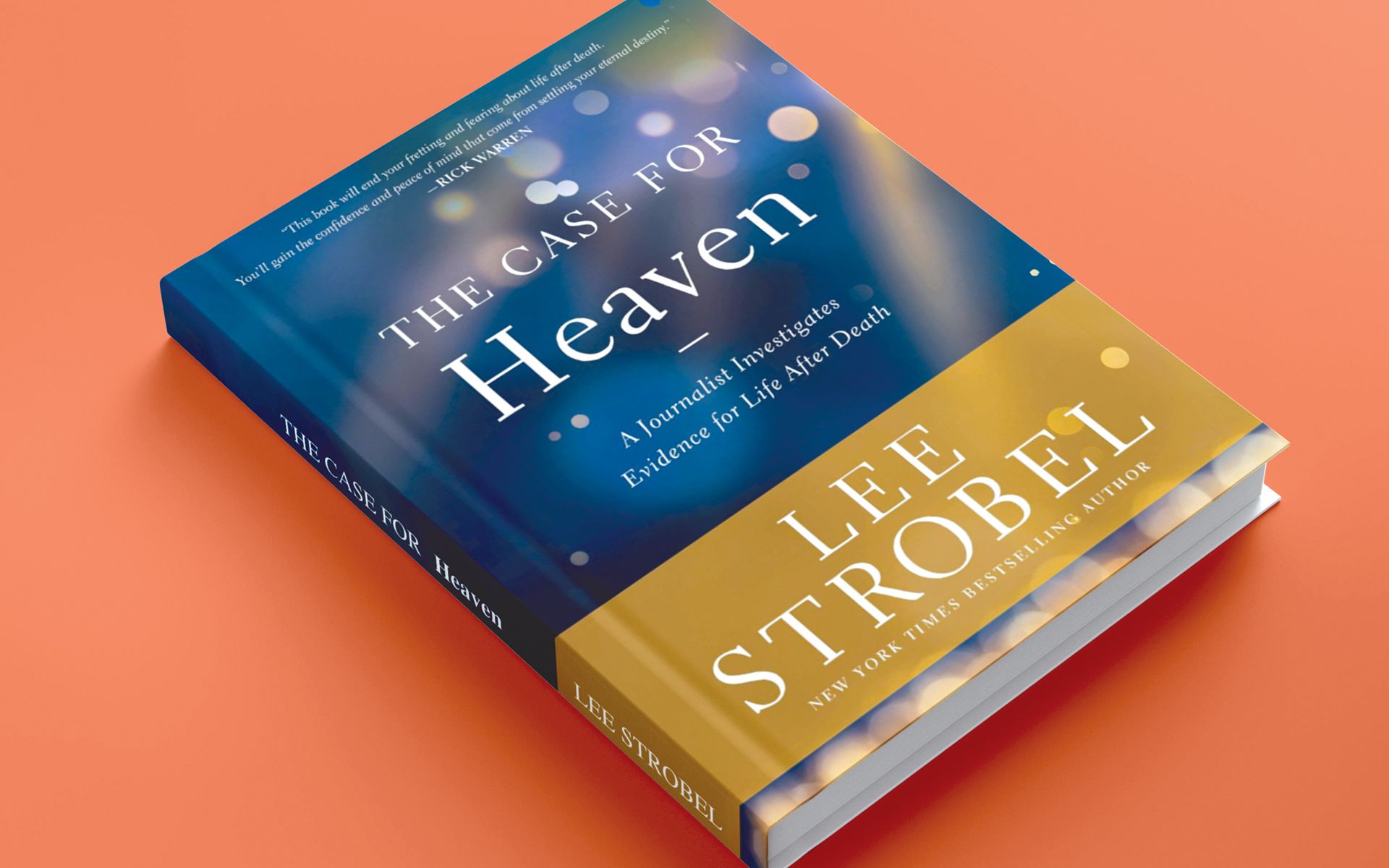The Case for Heaven

In This Article
-
Lee Strobel, a former award-winning legal journalist, investigates the evidence for an afterlife. In his book The Case for Heaven, Strobel interviews a spectrum of experts, including scientists, philosophers, and religious leaders, to weigh the evidence and reach a conclusion on the credibility of heaven.
-
NDEs, transformative encounters occurring after death, encompass a spectrum of sensations – peace, detachment from the body, and a journey through a tunnel toward a luminous light – reported universally across cultures.
-
The existence of suffering does not necessarily mean that heaven is not real. Strobel suggests that suffering may be a necessary part of our journey to spiritual growth and maturity.
The question of what happens after we die is one that has been pondered by humans for centuries. Is there an afterlife? If so, what is it like? These are questions that have no easy answers, but they are questions worth asking. In his book, The Case for Heaven, Lee Strobel, a former award-winning legal journalist, investigates the evidence for an afterlife. He interviews a number of experts on the topic, including scientists, philosophers, and religious leaders. Strobel's goal is to weigh the evidence and come to a conclusion about whether or not there is a credible case for heaven.
Strobel's investigative journey involves interviewing a spectrum of experts, including scientists, philosophers, and religious leaders, to weigh the evidence and reach a conclusion on the credibility of heaven. Commencing with a focus on scientific evidence, Strobel engages in a detailed conversation with Dr. Eben Alexander, a neurosurgeon who underwent a near-death experience (NDE) due to bacterial meningitis. The interview explores Alexander's NDE and its transformative impact on his perception of death and the afterlife. Strobel also converses with Dr. Gary Habermas, a professor of philosophy and apologetics at Liberty University. Habermas discusses the scientific evidence for an afterlife, including NDEs, apparitions, and reincarnation. In addition to the scientific evidence, Strobel engages with Dr. N.T. Wright, a distinguished New Testament scholar and bishop in the Church of England. The discussion centers on biblical teachings about heaven and their alignment with scientific and philosophical findings. Philosophical arguments enter the discourse as Strobel interviews Dr. William Lane Craig, a philosopher and professor of apologetics at Talbot School of Theology. Craig presents the argument from design, asserting that the universe's complexity implies an intelligent creator and, by extension, an afterlife. Closing the exploration, Strobel shares personal experiences contributing to his belief in heaven. He describes a number of encounters that he has had with people who have died and then come back to life. He also discusses the many stories that he has heard from people who have had their own NDEs.
The search for heaven
Strobel initiates a discussion on heaven, unveiling his incentive for penning the book. His personal history, marked by the loss of his father to cancer at the tender age of 12 and subsequent bereavements, including the tragic death of a friend's son in a car accident, forms a poignant backdrop.
Motivated by the profound human curiosity surrounding the topic, Strobel embarks on an exploration of the evidence for an afterlife. He acknowledges the universal yearning to comprehend what transpires after death and recognizes the prevalence of near-death experiences (NDEs) among millions globally. This awareness propels his quest to glean insights into the mysteries of the afterlife through the lens of these profound encounters.
Evidence from science: Near-death experiences and apparitions
Strobel’s exploration into evidence for an afterlife takes a profound turn as he delves into near-death experiences (NDE) and apparitions. In his interview with Dr. Eben Alexander, a neurosurgeon who underwent an NDE due to bacterial meningitis, the narrative unfolds. NDEs, transformative encounters occurring after death, encompass a spectrum of sensations – peace, detachment from the body, and a journey through a tunnel toward a luminous light – reported universally across cultures.
Alexander recounts commencing his NDE with a traverse through a dark tunnel, leading to a picturesque meadow teeming with flowers and trees. Amid this ethereal setting, encounters with beings, including his deceased father, and glimpses into the universe’s origins transpire. These vivid and consistent accounts, argued by Alexander as too detailed for dismissal as hallucinations, contribute to the mounting evidence for an afterlife.
To further enrich the exploration, Strobel engages with Anita Moorjani, a cancer survivor, detailing her NDE documented in the book Dying to Be Me. Moorjani’s narrative unfolds with a detachment from her body, leading to an existential void marked by profound peace and interconnectedness. Realizations about the nature of consciousness and our interconnected existence emerge, aligning with the broader theme of NDEs.
Dr. Gary Habermas, a professor of philosophy, extends the inquiry into scientific evidence, delving into apparitions. Apparitions, defined as visions of deceased people, have been reported by individuals of all ages and walks of life. The extensive research conducted on apparitions challenges conventional scientific explanations. While not universally accepted by all scientists, the compelling nature of NDEs and apparitions beckons a closer consideration of their potential role as evidence for an afterlife.
Evidence from the scripture
In a captivating interview, Strobel engages with Dr. N.T. Wright, a distinguished figure as a bishop in the Church of England and a globally recognized New Testament scholar. Wright illuminates the biblical evidence for an afterlife, demonstrating how teachings on heaven within the Bible align with insights from science and philosophy. Strobel brings forth biblical narratives, notably citing the Gospel of John’s account of Lazarus. Lazarus, a close associate of Jesus, succumbed to illness, leading to his entombment. Four days later, Jesus went to his tomb and called him out. This miraculous event serves as a compelling illustration of life after death.
Another biblical reference Strobel presents is the parable of the rich man and Lazarus from the Gospel of Luke. This poignant tale contrasts the opulent life of a wealthy man with the destitution of Lazarus, a beggar residing outside the rich man's gate. Upon their deaths, the rich man faces torment in Hades, while Lazarus finds solace in Paradise. Strobel interprets this parable as a testament to God's just nature, indicating divine retribution and reward in the afterlife.
The cumulative effect of these biblical accounts, including Lazarus' resurrection and the rich man and Lazarus parable, reinforces Strobel's assertion of the Bible as robust evidence for an afterlife. Acknowledging diverse interpretations among Christians—ranging from literal heaven and hell beliefs to more symbolic understandings—all converge on the shared understanding that the Bible affirms the existence of life after death. The overarching theme remains that God, as depicted in the Bible, will judge individuals based on their deeds, a belief uniting Christians despite differing theological perspectives.
Striking thoughts
In a captivating exchange, Lee Strobel engages in a conversation with Dr. Eben Alexander, a neurosurgeon whose life-altering near-death experience (NDE) prompted a profound shift in his understanding of reality. Dr. Alexander, once entrenched in materialism and skepticism toward the unmeasurable, vividly recounts his journey into a consciousness realm beyond the physical world. Despite defying scientific quantification, he emphatically asserts the authenticity of this transcendent encounter. Strobel probes into the transformative aftermath of the NDE, unraveling Dr. Alexander's heightened gratitude for life and an enhanced sense of compassion rooted in the realization of interconnectedness. Shifting gears to Dr. William Lane Craig, the dialogue navigates the argument from design as a compelling piece of evidence for an afterlife. Dr. Craig posits that the intricate order of the universe implies an intelligent creator, suggesting a purpose, potentially an eternal destiny, for humanity. This interview intricately weaves together NDEs, biblical perspectives, and the argument from design, offering a coherent framework challenging perceptions of an irrational or unscientific belief in an afterlife. Strobel concludes with reflections on the profound impact of such inquiries, emphasizing their transformative effect on one's perspective and appreciation for the precious gift of life.
Strobel's book is a thought-provoking work that presents a compelling case for heaven as he weighs the evidence and presents different perspectives on the topic. Even if you are not religious, Strobel's book is worth reading for its insights into the human experience of death and loss.
The book prompts many additional thoughts on the implications of the evidence for heaven. Here are some to reflect upon:
- If heaven is real, it means that death is not the end. We have an eternal destiny that awaits us. This can give us hope and comfort in this life, especially when we are facing difficult times.
- The belief in heaven can also motivate us to live better lives. We know that we will be judged for our actions in this life, so we have an incentive to make good choices and to treat others with kindness and compassion.
- The evidence for heaven also suggests that there is more to reality than the physical world. We are spiritual beings, and we have a spiritual dimension to our existence. This can help us to understand our place in the universe and our relationship to God.
Of course, there are also some challenges associated with the belief in heaven. For example, it is difficult to reconcile the idea of heaven with the suffering that exists in the world. However, Strobel argues that the existence of suffering does not necessarily mean that heaven is not real. He suggests that suffering may be a necessary part of our journey to spiritual growth and maturity.
Ultimately, the question of whether there is a heaven is a matter of faith.
Islamic perspectives on the Hereafter
Islam, rooted in the Quran and Hadith, presents a vivid portrayal of the afterlife, emphasizing its reality and eternal nature. The Quran depicts heaven as a place of eternal bliss and fulfillment, where gardens with flowing rivers offer everything one could desire (2:25), while hell is described as a place of suffering and punishment (3:131).
The Quran emphasizes the correlation between one's deeds in this life and their destination in the afterlife, providing a pathway to the paradise of everlasting joy. Islam assures its followers that the afterlife is not only real but also a manifestation of divine justice and mercy. Islam teaches that there are different levels of heaven and hell. The highest level of heaven is reserved for those who have been the most faithful and obedient to God. The lowest level of hell is reserved for those who have been the most wicked and rebellious. This perspective instills hope, encouraging believers to lead virtuous lives with the promise of a positive and rewarding afterlife.
Islam instills hope and positivity regarding the hereafter in its followers through several compelling avenues. Initially, it asserts that the Quran, revered as the divine word of God, unequivocally affirms the reality of an afterlife. Secondly, Islam imparts teachings from the Hadith, embodying the wisdom and actions of Prophet Muhammad, peace be upon him, reinforcing the belief in an enduring existence beyond this world. Thirdly, the faith underscores the presence of numerous signs in our present reality—ranging from the creation of the universe to the existence of the soul and the moral law—that collectively point towards a hopeful and purposeful afterlife. Here are some specific examples of how Islam teaches about the afterlife:
- The Quran says that heaven is a place of "gardens of perpetual bliss, beneath which rivers flow, wherein they shall have all that they desire" (Quran, 2:25).
- The afterlife is a place of justice. Prophet Muhammad, peace be upon him, said that "no one will be wronged on the Day of Judgment" (al-Bukhari)
- The afterlife is a place of immense mercy. The Prophet said in another hadith that "God is more merciful on the Day of Judgment than a mother is to her child" (al-Tirmidhi).
In exploring the multifaceted dimensions of the afterlife through various perspectives, from near-death experiences to religious teachings, a common thread emerges—hope. The intricate tapestry of beliefs and experiences weaves a narrative of a positive afterlife, emphasizing joy, justice, and mercy. Whether drawn from scientific inquiries, biblical narratives, or Islamic teachings, the collective message is one of optimism and purpose. While interpretations may vary, the underlying theme of a rewarding and fulfilling afterlife resonates, providing solace and motivation for individuals across diverse walks of life. As we navigate our present existence, the prospect of a positive afterlife serves as a guiding light, encouraging virtuous living and fostering a sense of hope in the eternal journey that awaits.







